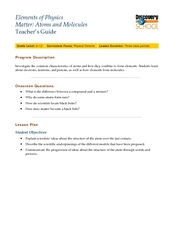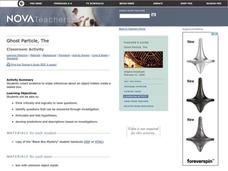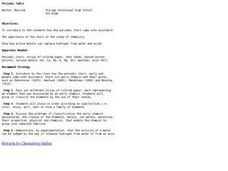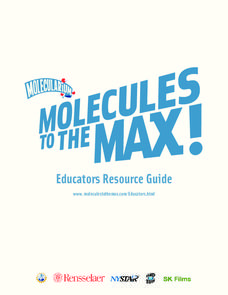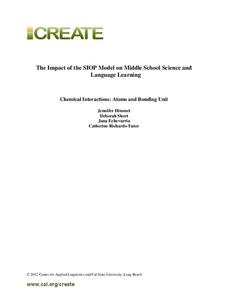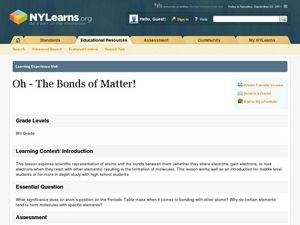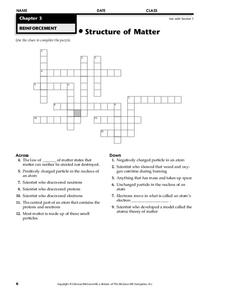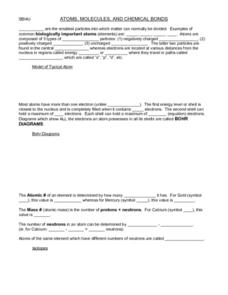Curated OER
Chemistry - Science 10
In this chemistry science learning exercise, students identify the parts of a chemical reactions. Students name the major particles of the atom. Students apply knowledge about the atom, theories, and models.
Curated OER
Biochemistry Assignment
In this biochemistry worksheet, students complete a table by filling in the missing information about different elements. Students draw the Bohr diagram and the Lewis dot diagram for several atoms.
Curated OER
Atom and Eve
Pupils research and define an atom using a concept map. They design and create a model of an atom, labelling all the parts, and write a journal entry.
Curated OER
Matter: Atoms and Molecules
Students investigate how information about the atom has been determined. In this atomic structure lesson, students draw what they think an atom looks like. They conduct Internet research about the types of atomic models and how...
Curated OER
The Ghost Particle
Students collect evidence to make inferences about a object hidden inside a sealed box. They think critically and logically to raise questions. Students identify questions that can be answered through investigation. They formulate and...
Curated OER
Structure of the Atom
Students identify the location and change of the subatomic particles of an atom. They name the three subatomic particles. Students review what they can recall about subatomic particles. They are given a worksheet on the subatomic...
T. Trimpe
Atomic Basics
Get down to basics with these worksheets on the structure of atoms. Challenging young chemists to identify information from the periodic table and create Bohr diagrams and Lewis dot structures for different elements, this...
Massachusetts Institute of Technology
Nuclear Synthesis
Start this lesson with a bang! The eighth in a 13-part series of lessons explains the origin of elements beginning with the Big Bang Theory. The reading describes the formation of elements hydrogen through uranium.
Curated OER
Ionic Bonds
In this ionic bond worksheet, students read about the transfer of electrons from one atom to another in ionic bonds. They answer seven questions about sodium and chlorine and draw Bohr-Rutherford diagrams to show the bonding between...
Curated OER
Charge Challenge
Young scholars observe the behavior of different charged objects. In this science instructional activity, students perform a series of static electricity experiments. They discuss their observations in class.
Curated OER
Periodic Table
Students identify the periodic table trends and predict material properties. They also design and conduct simple experiments and test material properties. Finally, students compare and contrast material properties and that chemical...
Curated OER
Science Puzzle
In this science worksheet, students identify and locate vocabulary words related to various sciences. There are 20 words located in the word search.
Rensselaer Polytechnic Institute
Molecules to the Max!—Educators Resource Guide
From molecules to nanotubes, an engaging unit explores the world of tiny science. Fifteen hands-on experiments and lessons engage young scientists as they learn chemistry. Discussions, worksheets, and data analysis reinforce the concepts...
Center for Applied Linguistics
Chemical Interactions: Atoms and Bonding
Watch budding chemists interact with the resource on chemical interactions. In the unit, six lessons provide an overview of basic chemistry, from understanding the development of atomic theory to distinguishing between ionic and covalent...
Bowels Physics
Electrostatics
Explore behavior of particles that cannot be seen with a detailed PowerPoint presentation that outlines the basics of electrostatics. The presentation addresses the charge of subatomic particles, conductors and insulators,...
Curated OER
Understanding Oxidation Numbers
Students review atomic numbers, positive and negative charges, and the periodic table. They examine the relationships among protons and electrons, location of various elements, electron energy levels, and oxidation numbers.
Curated OER
Oh - The Bonds of Matter!
Eighth graders identify the types of bonds elements form. In this chemistry lesson, 8th graders represent valence electrons with dot structures. They draw and label different atoms.
Curated OER
Atomic Structure
For this completing a chart of Elements or Ions worksheet, 6th graders fill in the blanks for the Atomic Number, Number of Protons, Number of Neutrons, and Number of Electrons. Students fill in 44 blanks.
Curated OER
Charge and Mass Worksheet #1
In this charge and mass worksheet, students complete a table by indicating the atomic number, the number of protons, the number of neutrons, the number of electrons and the mass number in given elements and isotopes. They compare...
Curated OER
Structure of Matter
In this science puzzle worksheet, students solve a crossword puzzle related to matter. For example, "Scientist who discovered protons."
Mr. E. Science
Magnetism and Electromagnetism
The biggest magnet in the world is at the Los Alamos National Laboratory in New Mexico and can reach 100 tesla. By comparison, magnets that lift cars are about two tesla. The 11th presentation in this series covers magnetism,...
Curated OER
Timing An X-ray Pulsar
Students use X-ray data to identify an object as a rotating neutron star, and determine its period of rotation. They use XTE observations of the Crab Pulsar to determine the period of the light intensity, interpret this period as the...
Curated OER
Atoms, Molecules, and Chemical Bonds
In this atoms worksheet, high schoolers review the parts of an atom, Bohr diagram, atomic number, mass number, and covalent bonds. This worksheet has 5 drawings and 26 fill in the blank questions.
Virginia Department of Education
Isotopes
Lead your class through the amazing world of isotopes as they investigate the various properties they contain and further understand their respective location on the periodic table. They explore half-lives and radioactivity as each...
Other popular searches
- Protons Neutrons Electrons
- Protons, Neutrons, Electrons
- Protons, Electrons, Neutrons
- Electrons, Neutrons, Protons
- Protons Neutrons, Electrons
- Protons Neutrons and Electrons
- Protons , Neutrons, Electrons





